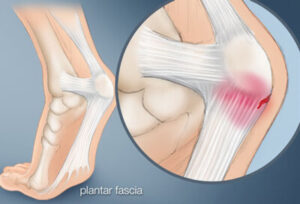Plantar Fasciitis
 Here’s the scoop. Plantar Fasciitis is inflammation of the thick, fibrous band of tissue that reaches from the heel to the toes, supporting the muscles and arch of the foot. “Plantar” refers to the bottom of the foot; “fascia” is supportive tissue. When the plantar fascia becomes overly stretched, tiny tears occur in its surface. The band of fascia becomes inflamed with all the pain associated with inflammation. Some experts attributed this type of pain to bony growths called heel spurs but their general agreement now indicates heel spurs are an effect of plantar fasciitis and not a separate cause of pain.
Here’s the scoop. Plantar Fasciitis is inflammation of the thick, fibrous band of tissue that reaches from the heel to the toes, supporting the muscles and arch of the foot. “Plantar” refers to the bottom of the foot; “fascia” is supportive tissue. When the plantar fascia becomes overly stretched, tiny tears occur in its surface. The band of fascia becomes inflamed with all the pain associated with inflammation. Some experts attributed this type of pain to bony growths called heel spurs but their general agreement now indicates heel spurs are an effect of plantar fasciitis and not a separate cause of pain.
Simply put, your calf muscle, one of your strongest muscles, attaches to the Achilles Tendon. In turn, your Achilles tendon, the strongest of all your tendons, attaches to the back of the heel bone. The Plantar Fascia connects to the bottom of your heel bone and runs the length of your foot to hold everything together. These inter-connections operate together as a single unit in which your heel bone is the pivot point.
 After a full day of standing and walking and working and exercising comes the time to relax and most people kick off their shoes and hit the couch and that’s when the problems start. The calf muscle tightens which then pulls on the Achilles tendon and the Plantar Fascia. That puts pressure on the arch when a person then stands up, you can see how much force is applied on the Plantar Fascia as the foot stretches and straightens. This, often and expectedly, causes minor tears of the Plantar Fascia. Once a tear becomes inflamed, pain follows as surely as night follows day.
After a full day of standing and walking and working and exercising comes the time to relax and most people kick off their shoes and hit the couch and that’s when the problems start. The calf muscle tightens which then pulls on the Achilles tendon and the Plantar Fascia. That puts pressure on the arch when a person then stands up, you can see how much force is applied on the Plantar Fascia as the foot stretches and straightens. This, often and expectedly, causes minor tears of the Plantar Fascia. Once a tear becomes inflamed, pain follows as surely as night follows day.
Plantar fasciitisBut this description is only a snapshot of what happens at any particular moment. In reality, the damage occurs over a long period of time. The pain is normally most severe in the morning because the calf muscle has not had a chance to stretch and relax. As you walk during the day the calf muscle loosens up which in turn frees both Achilles tendon and Plantar Fascia. Not surprisingly, once these two tendons move freely the pain recedes.
The tearing can affect people from all walks of life. Big, small, flat footed or big high arches. It doesn’t matter. What matters is how much pressure is being placed on the Plantar Fascia.
How will targeted treatment for plantar fasciitis help me?
Clinical testing proves a Walkin Motion® fluid filled insole in conjunction with an orthotic arch support provides relief from chronic plantar pain. This Targeted Treatment aims straight at the source of the problem.
- Fluid action stimulates healing blood flow massaging your feet while absorbing impact and distributing weight evenly.
- Redistributes body weight to eliminate pain, pressure, and fatigue leading to Plantar Fasciitis.
- Absorbs the shock of everyday standing, walking, and working on hard surfaces.
- Reduces inflammation by increasing circulation.
- Stretches and releases the tension caused by improper foot alignment.

